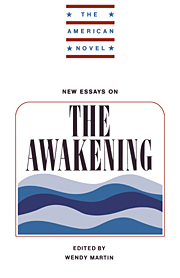Book contents
- Frontmatter
- Contents
- Series Editor's Preface
- 1 Introduction
- 2 Tradition and the Female Talent: The Awakening as a Solitary Book
- 3 Revolt Against Nature: The Problematic Modernism of The Awakening
- 4 The Half-Life of Edna Pontellier
- 5 Edna's Wisdom: A Transitional and Numinous Merging
- Notes on Contributors
- Selected Bibliography
2 - Tradition and the Female Talent: The Awakening as a Solitary Book
Published online by Cambridge University Press: 06 January 2010
- Frontmatter
- Contents
- Series Editor's Preface
- 1 Introduction
- 2 Tradition and the Female Talent: The Awakening as a Solitary Book
- 3 Revolt Against Nature: The Problematic Modernism of The Awakening
- 4 The Half-Life of Edna Pontellier
- 5 Edna's Wisdom: A Transitional and Numinous Merging
- Notes on Contributors
- Selected Bibliography
Summary
“Whatever we may do or attempt, despite the embrace and transports of love, the hunger of the lips, we are always alone. I have dragged you out into the night in the vain hope of a moment's escape from the horrible solitude which overpowers me. But what is the use! I speak and you answer me, and still each of us is alone; side by side but alone.” In 1895, these words, from a story by Guy de Maupassant called “Solitude,” which she had translated for a St. Louis magazine, expressed an urbane and melancholy wisdom that Kate Chopin found compelling. To a woman who had survived the illusions that friendship, romance, marriage, or even motherhood would provide lifelong companionship and identity, and who had come to recognize the existential solitude of all human beings, Maupassant's declaration became a kind of credo. Indeed, The Awakening, which Chopin subtitled “A Solitary Soul,” may be read as an account of Edna Pontellier's evolution from romantic fantasies of fusion with another person to selfdefinition and self-reliance. At the beginning of the novel, in the midst of the bustling social world of Grand Isle, caught in her domestic roles of wife and mother, Edna pictures solitude as alien, masculine, and frightening, a naked man standing beside a “desolate rock” by the sea in an attitude of “hopeless resignation” (Chap. 9). By the end, she has claimed a solitude that is defiantly feminine, returning to the nearly empty island off-season, to stand naked and “absolutely alone” by the shore and to elude “the soul's slavery” by plunging into the sea's embrace (Chap. 39).
- Type
- Chapter
- Information
- New Essays on The Awakening , pp. 33 - 58Publisher: Cambridge University PressPrint publication year: 1988
- 4
- Cited by



